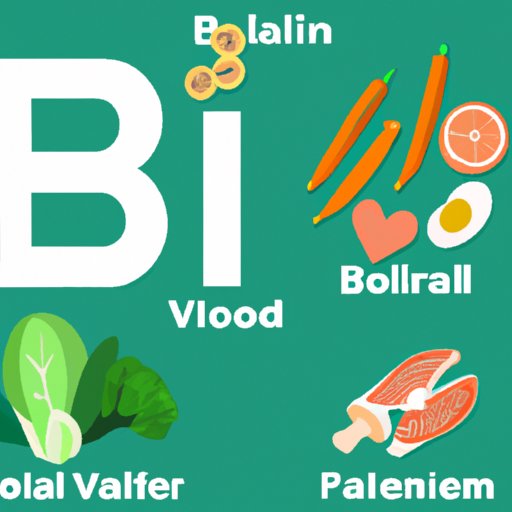
Introduction
When it comes to the essential B vitamins, folate might not be the most well-known but it certainly packs a powerful punch. Folate is vital for a variety of bodily functions and is especially important for promoting overall health. In this article, we’ll explore everything you need to know about folate, from its definition to the benefits of making sure you’re getting enough in your diet.
Everything You Need to Know About Folate – Your Ultimate Guide to Vitamin B
Folate, also known as vitamin B9, is a water-soluble vitamin that plays an essential role in many bodily functions. It helps to support the creation of DNA and RNA, as well as the production of red blood cells. Folate is also important for regulating homocysteine levels, an amino acid that, when elevated, can increase the risk of heart disease.
The recommended daily intake of folate varies depending on age and gender. For adult men and women, it’s recommended to aim for at least 400 micrograms per day. Pregnant women require higher levels of folate, at least 600 micrograms per day, to support fetal development.
Folate – the Essential B Vitamin for a Healthy Life
The benefits of folate are numerous and varied. One of the most well-known benefits is its role in promoting heart health. Studies have shown that getting enough folate can help reduce the risk of heart disease by lowering homocysteine levels and improving blood vessel function.
In addition to heart health, folate is also important for brain function. Studies have found that individuals with higher levels of folate may have better cognitive function and a lower risk of developing Alzheimer’s disease.
Folate is also crucial for pregnant women. Adequate levels of folate can help prevent birth defects in the baby’s brain and spine. It’s recommended that women who are pregnant or trying to conceive take a folic acid supplement to ensure they’re getting enough folate.
The Importance of Folate: How This B Vitamin Can Benefit Your Health
Scientific studies have shown that folate can have a positive effect on a variety of health conditions. For example, research has found that adequate levels of folate can help lower the risk of stroke, improve bone health, and reduce the risk of certain cancers such as colon and breast cancer.
Folate also plays a key role in overall quality of life. Studies have found that individuals with higher levels of folate tend to report better mental health and well-being, as well as a decreased risk of depression.
Folate vs. Folic Acid: What’s the Difference and Which is Better for You?
Many people use the terms “folate” and “folic acid” interchangeably, but they are two different forms of the vitamin. Folate is the form of vitamin B9 that is found naturally in foods like leafy green vegetables, fruits, beans, and legumes. Folic acid, on the other hand, is a synthetic form of vitamin B9 that is often added to fortified foods or taken as a supplement.
While both forms of the vitamin can be beneficial, research has shown that getting folate from natural food sources is more effective than getting folic acid from supplements or fortified foods. Additionally, some individuals may have difficulty processing folic acid and may benefit more from getting folate from food sources.
If you’re looking to incorporate more folate into your diet, it’s best to focus on eating a variety of foods that are high in the vitamin, rather than relying solely on supplements.
Plant-Based Sources of Folate: Your Guide to Meeting Your Daily B Vitamin Needs
Fortunately, there are a variety of delicious foods that are rich in folate. Leafy greens like spinach and kale are some of the best sources of folate, as well as other vegetables like asparagus and broccoli. Fruits like avocados and oranges are also good sources, as well as beans and legumes.
If you’re looking for some easy ways to boost your folate intake, consider incorporating some of these foods into your meals:
- A spinach and avocado salad with black beans and roasted sweet potato
- A broccoli and asparagus stir-fry with tofu and brown rice
- A smoothie made with kale, orange juice, and frozen strawberries
Folate Deficiency: Symptoms, Causes, and How to Avoid It
While folate deficiency is rare in countries with fortified foods, certain populations may be at risk for deficiency. This includes individuals with alcoholism, malabsorption disorders, and women who are pregnant or trying to conceive.
Some common symptoms of folate deficiency include fatigue, irritability, and weakness. Over time, a deficiency can lead to anemia, which can cause additional symptoms like shortness of breath, heart palpitations, and difficulty concentrating.
To avoid folate deficiency, it’s important to make sure you’re getting enough folate in your diet. This can be accomplished by eating a variety of folate-rich foods, as well as taking a supplement if recommended by a healthcare provider.
Conclusion
Folate is an essential B vitamin that plays a crucial role in many bodily functions. Its numerous benefits, ranging from promoting heart health to supporting fetal development, make it an important nutrient to prioritize in your diet. By incorporating folate-rich foods into your meals and talking to your healthcare provider about any potential supplementation, you can ensure that you’re getting the recommended levels of this vital vitamin.





